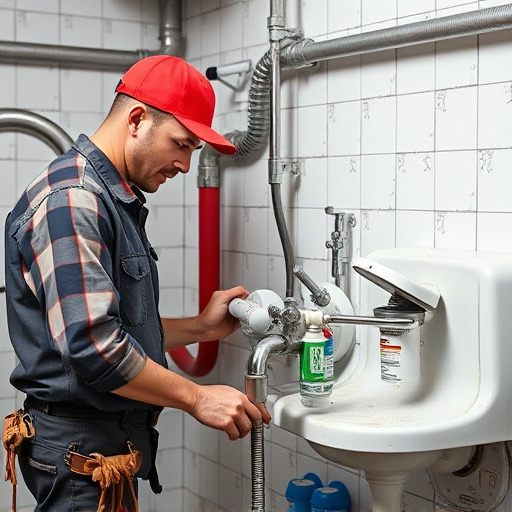Expansion tanks, a Jones Plumbing specialty, are crucial for regulating water pressure in complex systems. They buffer supply and internal networks, preventing damage from fluctuations. By managing volume changes, these tanks ensure efficient water distribution and extend plumbing lifespans. Jones offers installation, maintenance, and expert advice on atmospheric and pressurized tanks to keep systems running smoothly, saving clients time and money.
“Expansion tanks play a vital role in maintaining water system efficiency, ensuring smooth operation and longevity. This comprehensive guide delves into the intricacies of these often-overlooked components. From understanding their basic function to exploring various types and applications, we provide insights for both residential and commercial settings. Discover how Jones Plumbing specializes in optimizing water systems through strategic expansion tank integration, enhancing performance and preventing costly issues. Read on for installation tips, maintenance best practices, and the benefits these tanks offer.”
- Understanding Expansion Tanks: A Basic Guide
- Jones Plumbing: The Role in Water Systems
- Types and Applications of Expansion Tanks
- Installation and Maintenance Best Practices
- Benefits for Residential and Commercial Use
- Common Issues and Troubleshooting Tips
Understanding Expansion Tanks: A Basic Guide
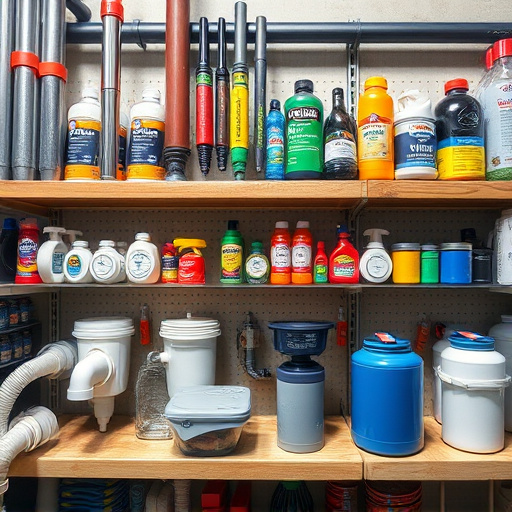
Expansion tanks are essential components in plumbing systems, particularly for homes and buildings with complex water supply networks. These tanks play a crucial role in maintaining optimal water pressure, ensuring a steady flow throughout the facility. By accumulating minor fluctuations in water volume, expansion tanks prevent sudden pressure spikes that can cause damage to pipes and appliances.
At Jones Plumbing, we often emphasize the importance of these tanks as a basic guide for homeowners. They act as a buffer between your plumbing system and the main water supply, allowing for subtle adjustments in water level. This simple yet effective mechanism helps extend the lifespan of pipes, valves, and other fixtures by mitigating pressure-related stress. Understanding how expansion tanks work is key to maintaining an efficient and reliable water distribution system.
Jones Plumbing: The Role in Water Systems
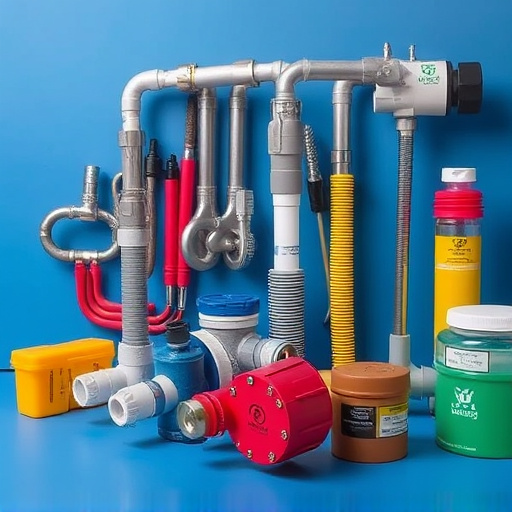
Jones Plumbing plays a vital role in modern water systems, acting as a crucial component for maintaining optimal pressure and flow. These plumbing experts specialize in installing and maintaining expansion tanks, essential devices designed to regulate water pressure in residential and commercial buildings. By carefully managing the system’s dynamics, Jones Plumbing ensures that water is delivered efficiently without any disruptions or damage.
The expertise of Jones Plumbing extends beyond installation; they also offer prompt maintenance services, crucial for preventing costly breakdowns. Regular checks and adjustments to expansion tanks by their skilled technicians guarantee peak performance, ensuring water systems run smoothly and reliably. This proactive approach not only saves clients time and money but also contributes to the longevity of their plumbing infrastructure.
Types and Applications of Expansion Tanks
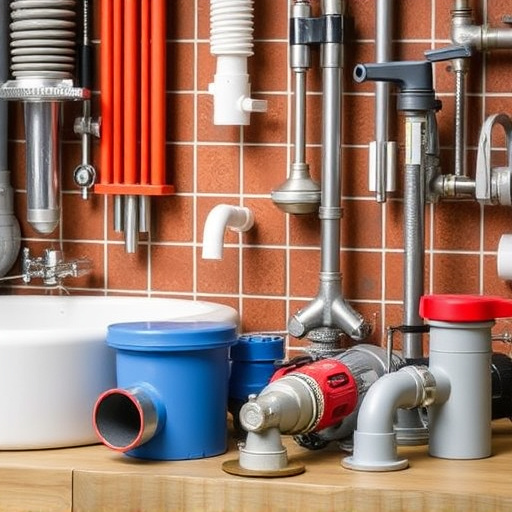
Expansion tanks, a vital component in many industrial and commercial plumbing systems, serve as pressure regulators and play a crucial role in maintaining system efficiency. These tanks come in various types, each designed for specific applications, catering to diverse needs across different sectors.
The two primary types are atmospheric and pressurized expansion tanks. Atmospheric tanks operate at the surrounding atmospheric pressure, commonly used in hot water heating systems and floor heating applications. Pressurized tanks, on the other hand, maintain a constant internal pressure, ideal for high-pressure plumbing systems, such as those found in large-scale industrial processes or multi-story buildings served by Jones Plumbing. These tanks ensure optimal performance by absorbing sudden volume changes in fluids, preventing excessive pressure buildup, and enhancing system longevity.
Installation and Maintenance Best Practices
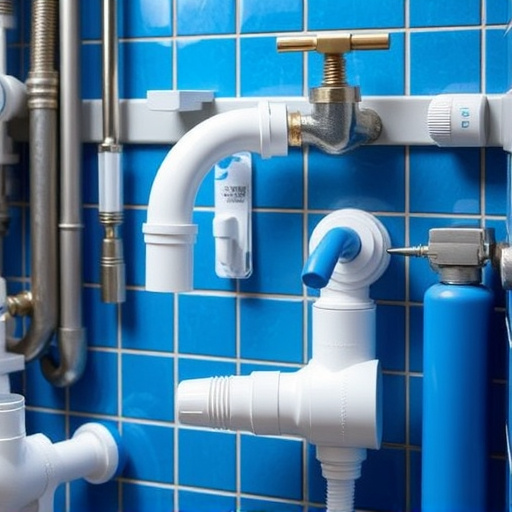
When installing an expansion tank, proper placement is key. It should be situated near the highest point of your plumbing system, often in a readily accessible area, to simplify maintenance and repairs. Jones Plumbing recommends consulting with a professional to ensure optimal positioning. Regular inspections are crucial for maintaining these tanks. This involves checking for any signs of corrosion, leaks, or damage, and ensuring the tank’s air pressure remains within recommended ranges.
For seamless operation, it’s essential to follow a consistent maintenance routine. This includes periodic cleaning to remove sediment buildup and regular testing of the tank’s water quality. By adhering to these best practices, you can maximize the lifespan of your expansion tank, promoting efficient water heating and overall system reliability, as endorsed by Jones Plumbing experts.
Benefits for Residential and Commercial Use
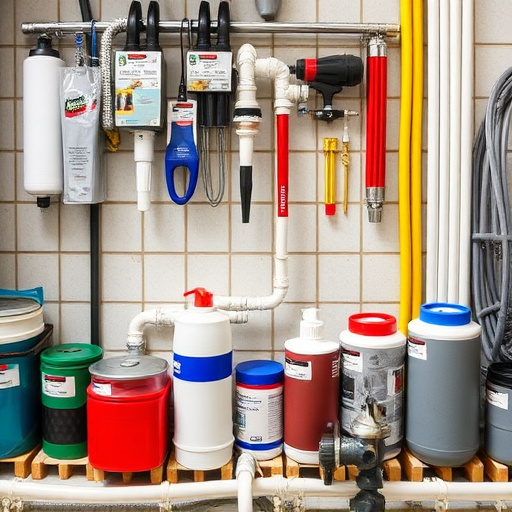
Expansion tanks are essential components in plumbing systems, offering numerous advantages for both residential and commercial applications. For homes, one of the key benefits is temperature control. These tanks help maintain consistent hot water supply throughout the day, eliminating sudden pressure drops and ensuring a steady flow of heated water to faucets, showers, and appliances. This stability is particularly beneficial for families with busy routines, ensuring everyone has access to hot water when needed.
In commercial settings, such as offices, hotels, or large apartment complexes, expansion tanks play a critical role in energy efficiency and cost savings. They help regulate pressure, reducing the strain on heating systems and potentially extending their lifespan. By minimizing pressure fluctuations, these tanks contribute to overall system stability, which can lead to lower energy consumption and reduced maintenance costs. Jones Plumbing, for example, emphasizes the importance of expansion tanks in designing efficient and reliable plumbing systems for various client needs.
Common Issues and Troubleshooting Tips
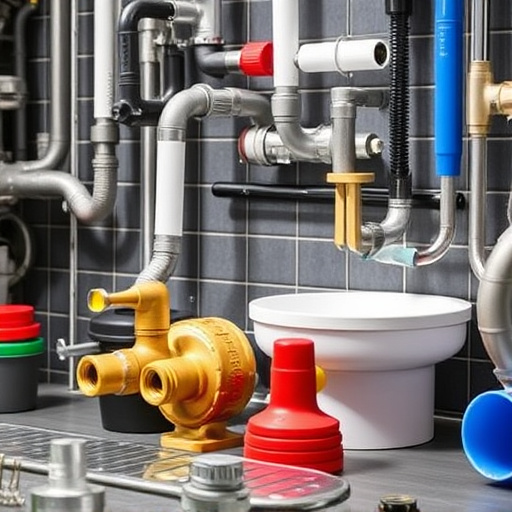
Expansion tanks are an essential component in plumbing systems, helping to maintain water pressure and prevent excessive strain on pipes. However, like any mechanical device, they can encounter issues over time. Common problems include tank corrosion, which may lead to leaks or reduced efficiency, and faulty air or water valves causing improper pressure regulation. If you notice unusual noises, such as banging or hissing, it could indicate a problem with the diaphragm or air valve.
At Jones Plumbing, we receive many calls regarding these issues. Troubleshooting tips include checking for any visible signs of damage or corrosion and inspecting the air valve’s position. Ensuring proper inflation of the tank’s diaphram is crucial. If problems persist, consider consulting a professional plumber who can diagnose and resolve the issue, ensuring your plumbing system operates smoothly and efficiently.
Expansion tanks play a vital role in maintaining water system efficiency, as demonstrated by the expertise at Jones Plumbing. By understanding their function and proper installation, homeowners and businesses can enjoy enhanced plumbing performance and longevity. These tanks, available in diverse types for various applications, offer numerous benefits, including improved pressure regulation and corrosion protection. Regular maintenance, as outlined in this guide, ensures optimal performance, addressing common issues before they become major problems. Whether for residential or commercial use, investing in an expansion tank is a smart move, ensuring smooth water system operations for years to come.
